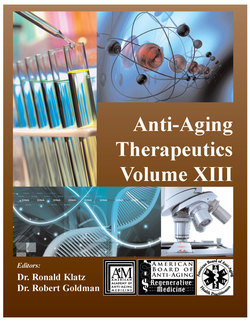Читать книгу Anti-Aging Therapeutics Volume XIII - A4M American Academy - Страница 54
На сайте Литреса книга снята с продажи.
Resveratrol and Diabetes
ОглавлениеA pandemic of type 2 diabetes is emerging in developed countries, and if trends continue it will overwhelm health care systems. While diet and obesity are certainly the primary contributors to this problem, the relationship of wine consumption and type 2 diabetes follows the now-familiar J-shaped curve. To some extent this is likely a statistical marker for other healthy behaviors, in that wine drinkers tend to be better educated, exercise more, and eat healthier diets, but recently there has been a convergence of diabetes research and anti-aging. Resveratrol and its derivatives are central to understanding the biochemistry of diabetes on a molecular level.
Type 2 diabetes is characterized by reduced insulin sensitivity and relative insulin deficiency, marked by inflammation in islet cells with deposition of amyloid oligopolymers. Therapies may be based on either enhancing insulin production by targeted reduction of islet cell inflammation or improving insulin sensitivity and glucose metabolism. As with amyloid in neural tissues, resveratrol has an inhibitory effect in islet cells.
An experimental model for diabetes can be produced by administration of streptozotocin, which has specific toxicity for mammalian pancreatic islet cells. Oral administration of resveratrol to streptozotocin-induced diabetic rats for 30 days reduces blood glucose, glycosylated hemoglobin, and downstream markers of diabetes to a degree comparable to standard diabetes medications. Additionally, insulin levels are increased and key enzymes of carbohydrate metabolism are returned to near-normal levels, along with improved hepatic glycogen levels.20 In an obese rat model of metabolic syndrome, long-term administration of resveratrol near-normalizes serum lipids, reverses hypertension, reduces hepatic lipid content, and reduces inflammatory status as measured by increased adiponectin and decreased tumor necrosis factor-alpha. Resveratrol has been shown to improve insulin sensitivity and up-regulate adipokine expression in adipose tissue, which plays an important role in metabolic homeostasis.
Glucose metabolism is mediated by adenosine monophosphate protein (AMP) kinase, an evolutionarily conserved enzyme which regulates cellular glucose uptake. AMP kinase also inhibits cholesterol and triglyceride synthesis and adipocytes lipolysis, and modulates insulin secretion. Mice on a high-fat diet but deficient in AMP kinase do not respond to resveratrol as do wild-type mice, who experience an increase in metabolic rate, insulin sensitivity, and physical endurance along with decreased fat accumulation. This indicates that resveratrol functions as an AMP kinase activator. The adipose-derived cytokine adiponectin, also an AMP kinase activator, is independently up-regulated by resveratrol. Leptin, which regulates appetite and energy expenditure, is elevated in obesity and down-regulated by resveratrol in a dose-dependent manner in isolated adipocytes.
The role of resveratrol in modulating the complex endocrine functions of adipose tissue are still being deciphered, but on balance appear to be beneficial based mostly on in vitro studies. It should be noted that another wine phenolic, quercetin, has also been reported to have anti-diabetic activity via many of the same pathways as resveratrol.
